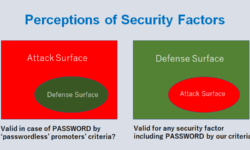Harshit Agrawal, a Radio Security Researcher based in India, participated in Risk Roundup to discuss Weaponized Radio Frequency and Its Role in Warfare Operations.
The Weaponization Of Radio Frequency Spectrum
Space-based systems and capabilities have become an essential component of the digital age as they provide the necessary support to many of our individual and collective activities. For instance, digital communications, navigation, financial transactions, weather monitoring, and more would not be possible without connected space systems. However, while the benefits are enormous and the advances in emerging technologies create new opportunities daily, new risks are also emerging for which we are not prepared.
For instance, many countries have developed warfare capabilities that can threaten any target’s ability to use space or connected cyberspace. When countries develop capabilities like jamming, all connected human domains are at risk. Moreover, the threats emerging from directed energy weapons and more can achieve a wide-ranging implication. So, there is a need to look at the evolution in warfare and evaluate superior warfighting platforms, weapons, and tactics. In an age of electromagnetic warfare, everything is at risk. So it is especially when it is not just the war domains that are evolving; war platforms and war weapons are evolving too, the very future of humanity is at risk.
At the core of this evolution are the emerging technologies that are fundamentally transforming warfare. The reason is that today, irrespective of countries or their components, electromagnetic interference (EMI) and radio frequency interference (RFI) consistently threatens any infrastructure operations, platforms, systems, components, sensitive equipment, and strategic security. Since Electromagnetic Warfare (EW) continues to evolve, the need for Radio Frequency Security is becoming crucial. So, it is crucial to evaluate:
- What are the trends in Electromagnetic Warfare?
- How is the Electromagnetic Spectrum controlled and manipulated?
- What is the capability of Radio Frequency detection equipment today?
- Is it possible to attribute intentional electromagnetic interference effectively and accurately?
- Is it possible to differentiate intentional versus unintentional interference?
- What is the state of the threat of Directed Energy Weapons (DEW)? Which countries are pursuing directed energy weapons?
- What are the challenges to security in converging cyberspace and space?
- Do we have a sufficient understanding of space warfare capabilities?
- Would the Industrial control system be able to withstand EM attack?
EW uses jamming and spoofing techniques to control the electromagnetic spectrum; it seems EW can be tricky to attribute and differentiate from unintentional interference.
Converging Cyberspace
Countries, cities, communities, and consumers are coming to rely on information technology. Unfortunately, while information and communication technology allows for the digital age, it also creates enormous new security risks. Whether it comes from the regular performance of nearby electronic devices or is part of a jamming attack, most connected devices and infrastructure are not always adequately shielded against electromagnetic interference (EMI) and radiofrequency interference (RFI).
Today, the dependency of military and perhaps civilian operations on Electronic Magnetic Surveillance (EMS) is a central facet of almost all activities as security forces worldwide have integrated EM capabilities into a vast majority of platforms, systems, and components. Since the systems are connected across all nations’ components, the question is whether Electromagnetic Surveillance is designed to protect the information environment of the entire nation.
Just like cyberspace permeates all other warfighting domains, including space, many space operations also depend on cyberspace. With sophisticated knowledge of satellite and data distribution networks, knowledgeable adversaries can use offensive cyber warfare capabilities to enable a range of implications against connected systems, associated ground infrastructure, users, and the links connecting them.
Irrespective of uplink jamming focused on the satellite or localized downlink jamming, intentional jamming should be considered an act of war. In addition, it should also be an act of war if spoofing deceives the receiver by introducing a fake signal with erroneous information.
Space Warfare
As Space Warfare is on its way to becoming a reality, space-based intelligence, surveillance, and reconnaissance have become essential. This is especially true when many countries have demonstrated jamming capabilities, so we must have a sufficient understanding of each country’s space warfare capabilities and know what is at risk.
Since many countries recognize the strategic value of space and cyberspace capabilities, in the coming years, at some point, they will attempt to deny their targeted nations access to the use of converging domains during a conflict when they can. Therefore, when capabilities to jam communications and GPS signals are rapidly becoming public knowledge, it is a cause of concern. Moreover, as many countries are trying to dominate the electromagnetic spectrum, the time is now to understand the Weaponization of the Radio Frequency Spectrum. For more, please watch the Risk Roundup Webcast or hear the Risk Roundup Podcast.
About the Guest
Harshit Agrawal is currently working as a Radio Security Researcher. He is enthusiastic about SIGINT, Drone Pentesting, and IoT Security. He presented his research at International Security conferences like RSAC USA, DEFCON, HITB Cyberweek, HITB Amsterdam, etc. Previously, he was President at CSI Chapter and Vice President for Entrepreneurship cell at MIT, where he also headed the team of security enthusiasts, giving him a good insight into cybersecurity and increased his thirst to explore more in this field.
About the Host of Risk Roundup
Jayshree Pandya (née Bhatt), Ph.D., a leading expert at the intersection of science, technology, and security, is the Founder and Chief Executive Officer of Risk Group LLC. Guided by societal necessities, her research has contributed to more than 100 publications, including four books. In addition, she serves in the C-Suite of leading emerging technology startups, actively applying her scientific background to designing systems that secure the future of humanity.
About Risk Roundup
Through the Risk Roundup initiative, Risk Group is on a mission to talk with a billion people: innovators, scientists, entrepreneurs, futurists, technologists, policymakers, to decision-makers. The reason behind this effort is to research, review, rate, and report strategic security risks facing humanity. This collective intelligence effort is essential to understand what destructive forces we need to be mindful of and where we need to focus on our collective security.
Risk Roundup is released in both audio (Podcast) and video (Webcast) format. It is available for subscription at (Risk Group Website, iTunes, Google Play, Stitcher Radio, Android, and Risk Group Professional Social Media).
About Risk Group
Risk Group is a Strategic Security Risk Research Platform and Community.
Copyright Risk Group LLC. All Rights Reserved





 Risk Group’s Idea Incubator Exchange Announces The Strategic Security Co-Innovation Model
Risk Group’s Idea Incubator Exchange Announces The Strategic Security Co-Innovation Model